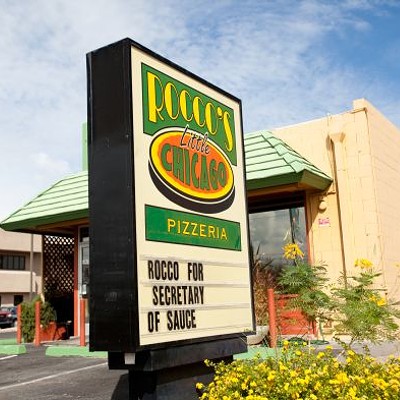The Puerto Rican-born actor, who won over critics with his Traffic portrayal of a Tijuana cop caught in the middle of a war between two drug cartels, dedicated his Oscar to the people of Nogales, Arizona, and Nogales, Sonora.
He might also have dedicated it to the Arizona Film Commission and its Sonora counterpart. The two film offices have maintained a long but informal partnership to wrangle filmmakers into location shooting along the border.
The partnership goes as far back as the 1970 film adaptation of Joseph Heller's Catch-22, but its most recent achievement was helping Traffic director Steven Soderbergh use Nogales, Sonora as a double for Tijuana.
Last weekend Arizona Governor Jane Dee Hull and Sonora Governor Armando Lopez Nogales made the relationship official at the annual Arizona Mexico Commission fall session in the Sonora state capitol, Hermosillo.
"It's a partnership that works out extremely well for both states," said James Ahlers, policy advisor for Hull's Arizona-Mexico Commission. "It's not a matter of whether we're competing with each other; instead, we're complementing each other. In the case of Traffic, the crew filmed in Sonora and stayed in Arizona."
As a recognized partnership, the commissions will combine their resources into one package when they hobnob in Hollywood. The AFC plans to debut its new offerings in April at Locations 2002, a trade show thrown by the Association of Film Commissions International.
"Arizona has equipment, the connections and the staff," Sonora Film Commission director Tecky Moreno said. "But we have locations that Arizona doesn't, like beaches."
The partnership is the first ever to link state film offices in two different countries, AFC director Linda Peterson Warren said.
The mission of the AFC, a division of the Arizona Department of Commerce, is to bring filmmakers (and their production piggy banks) to Arizona. The commission runs on an annual budget of $640,000 and a meager six-person staff, but boasts a return on investment in excess of $100 million in economic impact each year. Just this year, the commission arranged for Tim Burton to update Planet of the Apes around Lake Powell and for Ivan Reitman to release aliens and David Duchovny in Page for the film Evolution.
In addition to pinpointing suitable locations for filming in the state, the commission offers filmmakers a pair of scissors to cut through the red tape. The AFC arranges for the proper permits and sends out government liaisons to help clear the way.
And all at no charge to the filmmaker. The reasoning is that the money the commission spends on scenic photographs and promo packs is pennies compared to what a production company will spend locally on supplies and accommodations.
Films made outside Hollywood, often called "runaway productions," make up a $10 billion-a-year industry, and Arizona has held its market share for the last six years, Warren said. The commission's biggest challenge is competing with Canadian interests, she said.
"Essentially Canada throws money at filmmakers to cross the border and dump all their production money into their economy," Warren said. "There can be a savings of up to 40 percent, and that is very attractive."
But following the September 11 attacks, the FBI warned Hollywood to stay close to home for awhile, which could have filmmakers turning their cameras toward Arizona.
It's too early to tell what sort of impact the terrorist attacks will have on the border, but one thing's for certain: If it's going to take a crew an hour or two to get back and forth across the border, they're not going to film there. However, state officials are optimistic.
"Obviously border crossings are controlled by the federal government and I don't know if they'd make exceptions," Ahlers said. "But we have a good relationship with Customs and we're always in discussion with them and the President about the situation at the border. I'm sure we could work something out."
Tucson film office director Shelli Hall agreed that even when the nation is on high alert, the rules of Hollywood still apply.
"I don't know about the September 11 factor," Hall said. "I've read the stories about it taking hours to cross, but there's something about film and Hollywood that sometimes paves ways that aren't otherwise smooth. If you work with the right people who have the right connections, you can do it."
Hall has the text of del Toro's acceptance speech pinned to her office door. She was there when Soderbergh's production crew descended on Nogales in June 2000. Originally, she said, they didn't want to film in Mexico.
"They were looking for something to stand in for Tijuana," Hall said. "They didn't want to shoot in Mexico at all because they didn't want the hassle, so I showed them parts of Tucson and took them down to Nogales, Ariz. and they liked that. We found locations and we talked to the owners and we set it up.
"But when Steven Soderbergh came he asked us to take him across the border, and just started shaking his head at Nogales, Sonora and said, 'You can't duplicate this, the detail, the density.'"
Both commissions worked together to set it up so that Soderbergh's equipment would stay on the Mexican side of the border, while the actors and crew lodged in Rio Rico on the Arizona side.
"Our crew members and the actors went back and forth across the border all day long," Laura Bickford, one of the film's three producers, said. "It was sweet at the end, when Catherine Zeta Jones did her scene, they gave her a police escort out. We enjoyed being there and it seemed the city was very happy to have us."
Not many cities wouldn't welcome a guest that involves a crew of about 100 and a budget of $50 million.
To the governor's office, the partnership is a way to restore confidence down south while the future of the border is in flux.
'The border communities in Arizona are dependant on Mexican shoppers, particularly during the holiday seasons," Ahlers said. "We want people to feel reassured and know that Arizona and Sonora are continuing to work together."












